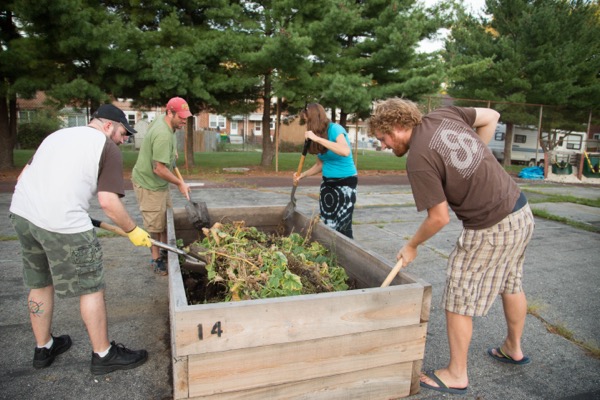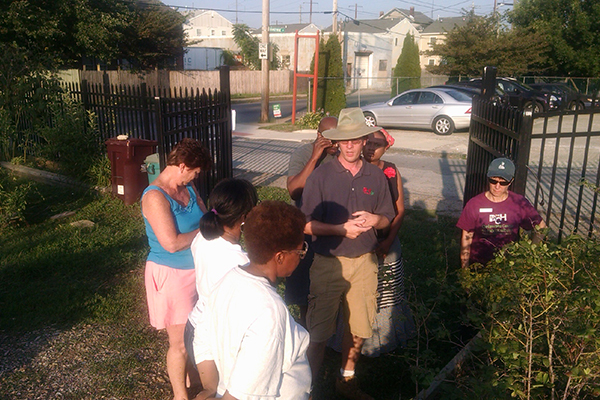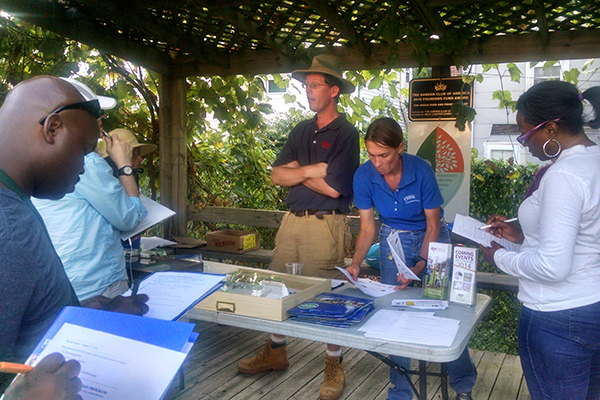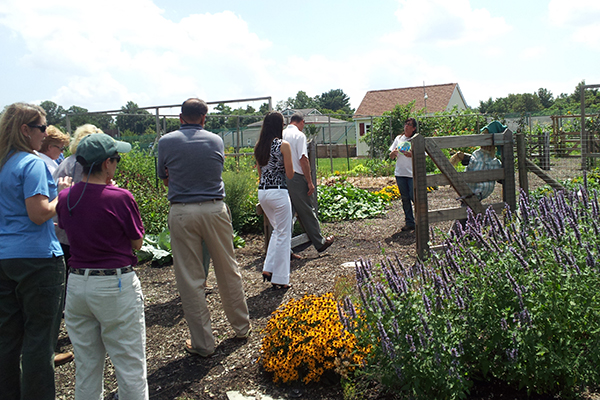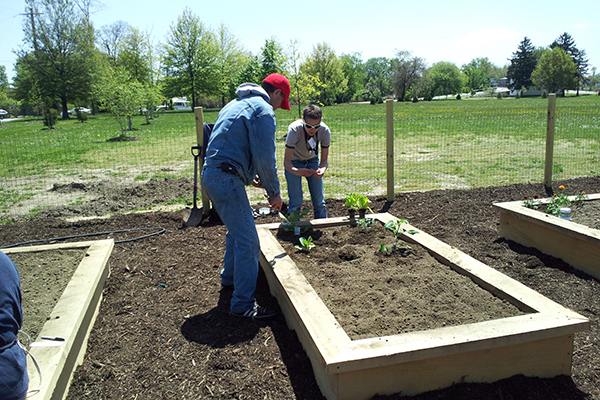Urban agriculture
UD's Cooperative Extension aids local urban farms, gardens
9:47 a.m., Oct. 28, 2014--Urban community and school gardens, and urban farms have been springing up all throughout the state and many of these have been helped along the way by the University of Delaware’s Cooperative Extension program, specifically Extension Master Gardeners and Master Food Educators.
Carrie Murphy, a Cooperative Extension agent at UD, explained that Master Gardeners, Master Food Educators and Extension as a whole are providing technical assistance and educational programming to gardens across the state, though the majority of the sites are in New Castle County.
Campus Stories
From graduates, faculty
Doctoral hooding
“We’re fortunate to have over 100 Master Gardener volunteers just in this county and in the last few years we’ve had such an explosion of requests to support urban agriculture projects, school gardens, community gardens and back yard, small-scale production that we’ve focused on training Master Gardeners to help,” said Murphy, adding, “A subset of the Master Gardeners has really dedicated their volunteer time to providing urban agriculture outreach programs.”
Helpful hands
Murphy said each garden is different but in general, they have helped communities test their soil, construct garden beds, design planting schedules and learn about basic garden maintenance.
“We also work with communities to evaluate a potential garden site,” said Murphy. “We walk around the site, make sure they have what they need -- for example, water and sunlight -- and just insure that they get off to a successful start.”
Often, Murphy said, they are working with communities that are fairly new to agriculture and gardening.
“Master Gardeners and Master Food Educators help communities better understand where their food -- like tomatoes, peppers and kale -- comes from, and we partner regularly with the Delaware Center for Horticulture,” said Murphy.
One of the sites that has benefited from Extension’s help is the Garden at Linden, a community garden in Elsmere run by Elisa King, a 2013 UD graduate.
King said Murphy has made herself available to answer questions and helped get the garden up and running.
“She’s been awesome. I contacted her when we had some issues with certain plants. She stopped by and checked things out for us to see what the problem might be and gave us some possible solutions, so she has definitely made herself readily available,” said King. “She’s come to consult with us on planting season and after we built, we were trying to plan out the growing season and she helped us with that and provided us with some really good resources. Carrie has been involved whenever we need her to be.”
Delaware Urban Farm and Food Coalition
Another way that these gardens have been helped is through the Delaware Urban Farm and Food Coalition, which is made up of nearly 80 individuals and organizations and co-chaired by Murphy and Tara Tracy, urban agriculture manager for the Delaware Center for Horticulture.
One notable urban farm supported by the coalition is the first in the city of Wilmington, the 12th and Brandywine Farm. This farm was developed as the flagship effort for the coalition. It has almost 1,400 square feet of a three-season growing area in raised beds, and is situated in an area of the city where residents have little direct access to fresh fruits and vegetables.
Tracy explained that the farm has both a production component to it — supporting a farmer’s market in the community — and a community garden component, as it includes another 600 square feet of raised beds for community members to rent plots in which to grow food for their families.
Community engagement
The main thing community gardens and farms need to be successful is buy-in from the community members.
Murphy said, “Many of the projects are homegrown and grassroots where community members have identified an interest in starting or connecting into a growing project.”
When the community is deeply involved in the planning and upkeep of their farm or garden, it leads to community development and community engagement.
“When you think about farming on a small scale in an urban environment, it has a different set of impacts and benefits and considerations. Really, the benefits of social and community are almost one in the same,” said Tracy. “People in a neighborhood that might be somewhat divisive can come together in a community setting to ‘green’ their neighborhood. It might not be through a community garden, but they come together planting trees or creating rain gardens, or something like that. It’s creating those connections with people so it has the benefit of improving the community, along with economic and aesthetic benefits.”
Garden for the Community
In Newark, there is a fine example of an urban farm in UD’s Garden for the Community, which is located on a third of an acre on the College of Agriculture and Natural Resources (CANR) campus. The garden includes vegetables, herbs and some fruits to provide fresh, local, sustainably grown produce and donates some of that food to the Food Bank of Delaware steadily throughout the year.
Of the Garden for the Community, Murphy said, “It’s a great growing and demonstration space where you can learn more about small-scale production and different types, including ethnic varieties, of fruits and vegetables. I direct people to the site all the time.”
The University also has a UD Fresh to You program with produce grown on the CANR campus and sold at the UDairy Creamery and at the UD Farmers Markets throughout the summer.
In addition, the city of Newark announced that its first community garden will be opening in 2015 at Fairfield Park.
Murphy has been working with the city on the project and they are planning workshops in the winter for the community gardeners.
For those in Newark who are interested in a gardening plot, visit the city of Newark Parks and Recreation page.
For more information on the Delaware Urban Farm and Food Coalition, visit the website.
Article by Adam Thomas






